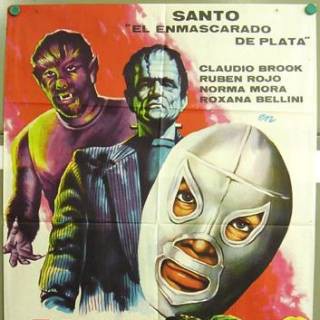This upcoming semester, students can learn about superheroes that are not of the Marvel or DC variety — but are just as significant in the cultural history of Mexico. Luis E. Coronado Guel, Ph.D, will be teaching a new course that aims to bring some diversity to students’ understanding of history in a way that makes it entertaining and educational.
Between 12:45 and 1:45 p.m. Tuesdays and Thursdays, Guel will give students an opportunity to learn about Mexican pop culture, and the deeper meaning behind its many elements. He said that Mexican superheroes give us a way to experience and perceive the world around us through not only their own personal lens, but also the lens of their culture.
“Students will be reading up on and viewing films and videos of multiple materials that will be leading the course in a time frame that is telling the history of modern Mexico since the 19th century,” Guel said. “We’ll advance in time and use different examples that explain the historical significance in which these characters were created.”

Guel was born in San Luis Potosí, Mexico and attended law school at Autonomous University of San Luis Potosí. While in Mexico, he taught classes covering Mexican law, commercial law and other legal topics to both undergraduate and graduate students. Soon after, Guel turned to his true passion in life: history. He began pursuing his master’s degree in the subject at El Colegio de San Luis, where he not only studied but taught. After moving to Arizona in 2008, Guel came to the University of Arizona to earn his doctorate in Latin American history, which he completed last year.
As a self-described cultural historian, Guel says his main topic of research is modern Mexico spanning from the 1920s to present. The love and interest he has for the culture and history of the country inspired him to teach this new course.
At the UA, Guel served as a teaching assistant in the history department. Since beginning his teaching career, he has covered a variety of topics including Mexican-American history, borderlands history, Latin American history and modern Mexico.
Guel examined many different aspects of modern Mexico, but he was particularly interested in the cultural history of the country — and the framing of that culture through entertainment such as TV shows, music, cinema, and other popular culture.
RELATED: Tucson Cine Mexico celebrates Mexican culture with film
“Watching TV with my mom every Saturday and watching these black and white movies from the so-called ‘golden age’ of Mexican cinema, and I enjoyed all of the movies starting from the 1940s to 1950s, and I was young so it was an important memory for me,” Guel said. “For this course, I wanted to give my students a different approach to life in terms of how they learn the course, so my main interest is trying to link the everyday life of a student [and] the things we enjoy with a dose of popular culture and the meaning behind a lot of it.”
His own connections to and love for the culture inspired the decision behind teaching this course. Guel enjoys working with students who are interested in Latin America and Mexico as well as people who want to familiarize and connect themselves with the framework of Mexican pop culture.
The 16-week class is a great way to explore topics that are prevalent in Mexican culture today. The course examines Mexican society and culture through discussions of gender, class, race and education, and presents topics through the mediums of music, film, comics and television.
Guel said that many superheroes from Mexico were created during the Cold War and at other times when the country was facing a national crisis. In many ways, the characters that sprang from those harsh conditions reflected the fear, hopes, and stereotypes of the Hispanic community during that time.
The curriculum will allow students to discover the deep implications that pop culture has in people’s lives.

One of the household-name superheroes from Mexico is El Chapulin Colorado, created by Roberto Gómez Bolaños.
“El Chapulin Colorado” first aired in the 1970s, portraying a different kind of superhero. He isn’t the smartest or the strongest — or tall and handsome like the traditional Superman — but he serves an important purpose.
El Chapulin Colorado exemplifies how people sometimes perceive themselves as underdogs dealt the short end of the stick. Nevertheless, success for him is always possible, whether it comes from luck, persistence, or a combination of both.
Some of Guel’s favorite pop culture icons include Cantinflas, Frida Kahlo, El Santo, Pedro Infante — all of which are discussed in the class this fall. He also described a comedic kind of parody version of El Santo as a cartoon version named El Santos, which takes a 1940s character and reintroduces it with a 21st-century spin.
Students can expand their knowledge and learn the cultural significance that created Mexican superheroes, and how these characters reflect an entire society.
RELATED: UA continues working to include large Hispanic community
They will learn that not every great superhero was created by Stan Lee, and that these lesser-known superheroes demonstrate the hopes and fears of those who created them as well as the triumph and success of the era in which they were created.
As Guel summarized, “The main reason I put together this course was to be able to teach students history in a funny and engaging way, and making sure the field of history is alive for new generations — because one of my opinions is that this type of course will give students a different viewpoint on people from other cultures and hopefully encourage people to be kinder, because we can all laugh, smile and learn in the same way.”
Follow David Pujol on Twitter.









